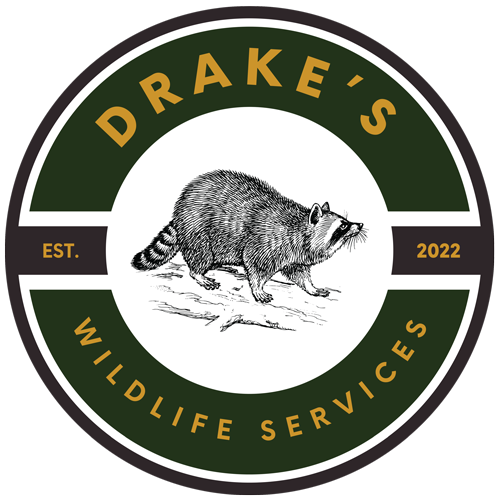Baby Animal Season: Why Wild Critters Are Breaking Into Homes This Spring
As springtime rolls in, nature begins to bloom, and so does wildlife activity. It's baby animal season—and for raccoons, squirrels, and skunks, that means finding safe, quiet places to give birth and raise their young. Unfortunately, human homes often provide the perfect shelter.
At Drake’s Wildlife Services, we’ve already responded to multiple cases this season where raccoons broke into attics, soffits, or crawlspaces to create nurseries for their babies. In each case, we worked quickly and humanely to remove the mother and her young, then secured the home to prevent future intrusions. This time of year, we’re not just dealing with nuisance wildlife—we’re managing families of animals, and that requires both skill and compassion.
Why Animals Break Into Homes in Spring
Spring is the nesting season for many wild animals. As the days grow longer and temperatures rise, critters come out of winter hiding and start looking for safe, warm spaces to have their babies. Natural dens can be hard to come by, especially in urban and suburban areas where development has reduced natural habitats. That’s when attics, chimneys, crawlspaces, and sheds start to look like prime real estate.
These spots offer:
- Shelter from predators and harsh weather
- Soft insulation to build nests
- Relative quiet during the day
For animals like raccoons, squirrels, and skunks, a home can seem like the ideal spot to raise young—but what’s perfect for them is far from ideal for you.
Which Animals Are Most Likely to Nest in Your Home This Spring?
Here are some of the most common animals we find in homes during baby season:
Raccoons in the Attic
Raccoons are smart, strong, and resourceful. They can tear through shingles, squeeze through roof vents, and pry open soffits to gain entry. Once inside, a mother raccoon will create a nest in your attic insulation, making it hard to remove her without disturbing her babies.
Squirrels in Walls or Roofs
Squirrels typically enter through roof gaps, attic vents, or even wall cavities. Once inside, they chew through insulation and wires while building nests. Baby squirrels are often hidden deep within the insulation, making it essential to remove the entire family carefully.
Skunks Nesting Under Decks
These animals usually den under porches, sheds, or decks. During baby season, a skunk may become more defensive and territorial, increasing the risk of spraying if disturbed. If a den is under your home, odor and digging damage can become a serious issue.
Birds and Bats Nesting in Chimneys and Attics
While often overlooked, both can enter attics or chimneys to nest. Baby birds and bats can’t fly for weeks after birth, which complicates removal and increases the chance of structural contamination from droppings.
The Importance of Humane Wildlife Control
Removing wildlife during baby season isn’t as simple as setting a trap. Many of these animals are fiercely protective mothers. Separating babies from their mothers can lead to suffering and even death if not handled properly. That’s why it’s so important to choose a professional wildlife control company that uses humane removal methods.
At Drake’s Wildlife Services, we:
- Locate and remove both mother and babies safely
- Use techniques like one-way doors and eviction fluid when appropriate
- Avoid trapping and relocating animals unnecessarily
- Provide temporary housing for orphaned or displaced wildlife when needed
- Coordinate with licensed wildlife rehabilitators if a baby is too young to survive on its own
It’s not just about keeping your home safe—it’s about protecting the animals, too.
How to Tell If Animals Are Nesting in Your Home
During baby animal season, be on the lookout for these signs:
- Scratching or movement sounds, especially at dawn or dusk
- Unusual odors coming from walls, ceilings, or crawl spaces
- Droppings or nesting materials inside the attic
- Pets acting alert or agitated around specific parts of your home
- Repeated sightings of a wild animal entering and exiting the same location
If you suspect an animal is living in your home, do not try to remove it yourself. Disturbing a mother with babies can lead to aggression or abandonment, and improper removal may leave babies behind, which can result in odor, infestation, or death.
Why Prompt Wildlife Removal is Essential in Spring
When animals give birth inside your home, the risks go beyond noise or inconvenience:
- Damage to insulation, ductwork, and electrical wiring
- Contamination from urine, feces, and nesting debris
- Health risks including parasites, bacteria, and airborne pathogens
- Structural damage from digging, chewing, or nesting
The longer a wild animal remains in your home, the more extensive (and expensive) the damage can become. That’s why early intervention is crucial.
Our Spring Wildlife Removal Services
Our team at Drake’s Wildlife Services specializes in humane, effective wildlife removal and exclusion. We understand the behavior of mother animals and know how to safely evict families without causing harm. Once removal is complete, we:
- Seal up entry points to prevent re-entry
- Repair damage caused by nesting
- Clean and sanitize contaminated areas
- Offer preventive tips to keep your home secure through every season
We believe every home deserves peace and every animal deserves compassion. Baby season shouldn’t mean you’re stuck with uninvited guests.
Protect Your Home and Wildlife This Baby Animal Season
Spring brings beauty, warmth, and new life—but it also brings a surge in wildlife activity. If raccoons, squirrels, or other animals have moved into your attic or crawlspace, you’re not alone. Baby animal season is one of our busiest times of the year for a reason.
Let us help you take care of your home and the wildlife around it. Our humane removal methods ensure safe outcomes for both your family and the animal families looking for shelter.
Need help with baby wildlife in your home? Contact us today for expert removal, cleanup, and prevention.
